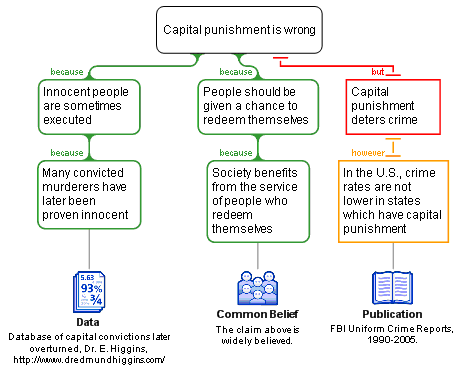The Science Of Scientific Writing Set 8 Set 8-More on assessing • Second page • Third page • Example • Exercise 1 • Exercise 2 • Writing an assessed argument • Final Page Set 8.
OVERVIEW: The way to well-written science
PART I: Paragraphs and Sentences
SET A: Paragraphs: The Maps Behind Them
SET B: Paragraphs: Using Maps to Meet Readers' Expectations
SET C: Paragraph Coherence and Cohesion
SET D: Sentences
SET E: Scientific Sections (including Methods)
SET F: Scientific Sections: The Discussion
SET G : Scientific Sections: The Introduction
SET H : The Paper as a Whole
Exercise 2
1. Evaluate the following argument map:
Drag this image onto the workspace to proceed. You must be using the inbuilt browser in Rationale 1.3 or later.
Hints
-
Start evaluating at the left-most basis box and work through one branch at a time from bottom to top, and finish by evaluating the position
-
When evaluating basis boxes, ask yourself: is this a reliable source of information? Does this basis provide sufficient sufficient evidence for me to believe the claim above it?
- When evaluating
reasons, ask yourself: what confidence do I have in this reason, given
my assessment of its basis?
- If you think its basis is reliable, ask yourself: does this reason give support for the claim above it? How good a reason is it - strong or weak?
- If you think its basis is unreliable, ask yourself: could I still reasonably accept this claim on other grounds? If the answer is no, then the reason can't provide any support for the claim above it.
- Evaluate objections the same way that you evaluate reasons, but the question becomes: does this claim undermine the claim above it?
- To evaluate the position, ask yourself: what confidence do I have in this, given my evaluation of the top layer of reasons and objections? On balance, is there a better case for accepting it, rejecting it, or taking no stand on the matter?
2. Check your work against the model.
Content of this page drawn in whole or part from the Austhink Rationale Exercises with permission from Austhink.
